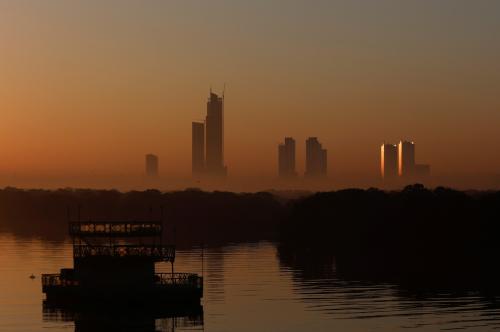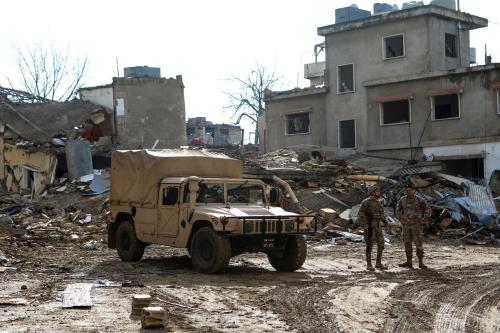Editor’s Note: This piece originally appeared on
Lawfare
.
Ayman al-Zawahri, the emir of al-Qaida since 2011, has not spoken publicly since last September. This eight-month gap is his longest absence from the public stage since the fall of Kabul in 2001. It is likely he is biding his time for a special purpose but his motive is elusive.
The 63-year-old Egyptian has been a jihadist fighter and plotter since 1981 when he was part of the conspiracy that assassinated Anwar Sadat. Born into the upper elite of Cairo society, Zawahri turned to jihad out of a deep hatred of Israel and America’s support for Israel. He has been a brutally tortured prisoner, a fugitive for decades wanted by dozens of intelligence services, and a prolific writer of books about the global jihad. Zawahri has been a constant on al-Qaida’s Al Sahab propaganda medium for a dozen years with scores of taped messages.
On September 4, 2014, Zawahri announced the formation of a new al-Qaida branch in the Indian subcontinent. He said it had been in development for years and would seek to intensify jihadist activity in India, Pakistan, Bangladesh, Burma, and the Maldives. He promised this group would restore Islamic rule in South Asia like it was during the Mughal Empire.
Within days the new group took credit for an attempt to hijack PNSZulfiqar, a Chinese-built Pakistani Navy frigate equipped with ship-to-ship missiles, from a naval base that houses nuclear weapons in Karachi. The plot was spearheaded by al-Qaida-recruited Pakistani navy personnel. The goal was to use the hijacked Zulfiqar to attack U.S. Navy and allied ships in the Arabian Sea, but it was foiled before the ship left Karachi harbor. Al-Qaida had wanted to attack an American aircraft carrier, its most audacious plot since 2006 when it conspired to simultaneously blow up a half-dozen jumbo jets over the Atlantic en route to Canada and the United States from London. If the Zulfiqar plot had succeeded it might have provoked war between America and Pakistan. It was an attack intended to change history like 9/11.
Since then the new al-Qaida group has taken credit for a wave of assassinations of secular opponents of jihadism in South Asia. As Zawahri promised last September, Bangladesh has been a major target for these attacks.
But Zawahri himself has been uncharacteristically silent. He did not comment when al-Qaida in the Arabian Peninsula (AQAP) took credit for the Charlie Hebdo attack in Paris in January, an attack AQAP said Zawahri had ordered. Zawahri had been calling for an attack in France for a decade so his silence is all the more notable. It was a triumph but the emir said nothing.
Nor has the emir commented on developments like the wars in Iraq, Syria, and Yemen; the succession in Saudi Arabia; or jihadi attacks in Australia, Canada, and elsewhere. In the past such events routinely got detailed commentary from Zawahri.
Nor has he eulogized al-Qaida’s recent martyrs. The drone mission that inadvertently killed an American and an Italian hostage in Pakistan last January also killed Ahmad Farouq who was the second in command of the al-Qaida Indian subcontinent branch. Farouq was in charge of operations in Pakistan and presumably behind the Zulfiqar plot. Zawahri would usually have issued his own eulogy for a martyr of this stature. Nor has he praised the years of jihadi service of the AQAP leader Nasr bin Ali al-`Ansi who issued the claim for the “Blessed Battle of Paris” when a drone strike killed him in Yemen this month.
Zawahri is almost certainly not a martyr himself. Al-Qaida has never failed to announce the death of its leaders since it takes great pride in their martyrdom. Al-Qaida has already named Zawahri’s heir, AQAP leader Nasir al-Wuhayshi, so there is no succession issue. So what explains his silence?
Of course only he and his inner circle know. We can only surmise Zawahri is biding his time for reasons unknown. He may have plots in the works even more audacious than the Zulfiqar. He may be waiting to strike the match for some spectacular operation.
Perhaps he is waiting for the demise of his nemesis Abu Bakr al Baghdadi, the self-appointed Caliph Ibrahim of the Islamic State, who is widely rumored to be injured. (Until this past Thursday, Baghdadi himself had not released a message since November.) Zawahri was a scathing critic of Baghdadi’s mentor Abu Mus`ab al-Zarqawi a decade ago but he kept his critique private even when Zarqawi was killed by an American air strike. Maybe Zawahri is waiting for another air strike to shake off the upstart caliph. It is safe to conclude Zawahri has his reasons for his silence.
The Brookings Institution is committed to quality, independence, and impact.
We are supported by a diverse array of funders. In line with our values and policies, each Brookings publication represents the sole views of its author(s).



Commentary
Where is al-Qaida leader Ayman al-Zawahri?
May 18, 2015